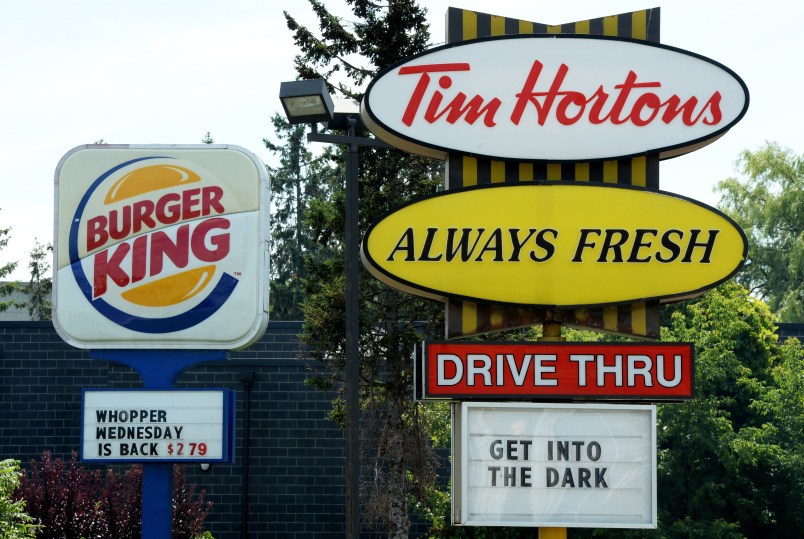MIAMI (AP) — Burger King says it struck a deal to buy Tim Hortons Inc. for about $11 billion, a move that would give the fast-food company a stronger foothold in the coffee and breakfast market.
The corporate headquarters of the new company will be in Canada, which stands to help lower Burger King’s corporate taxes. Such tax inversions have been criticized by President Barack Obama and Congress because they mean a loss of revenue for the U.S. government. Burger King and Tim Hortons said the chains will continue to be run independently and that Burger King will still operate out of Miami.
The deal would create the world’s third largest fast-food company with about $23 billion in sales and more than 18,000 locations, the companies said.
The tie-up could help Burger King and Tim Hortons pose a greater challenge to market leaders such as McDonald’s and Starbucks and reflects a desire by both companies to expand internationally. Burger King, which has nearly 14,000 locations, has been striking deals to open more locations in developing markets. The company sees plenty of room for growth internationally, given the more than 35,000 locations McDonald’s has around the world. Tim Hortons has more than 4,500 locations, mostly in Canada.
Back in the U.S., breakfast and coffee have been hot growth areas in the fast-food industry. Between 2007 and 2012, breakfast grew faster than any other segment in the restaurant industry at about 5 percent a year, according to market researcher Technomic. But it has long remained a weak spot for Burger King.
McDonald’s Corp. led the category with 31 percent of the market in 2012, while Burger King Worldwide Inc. had just 3 percent to 4 percent, according to Technomic. As newer players such as Taco Bell have pushed into breakfast, McDonald’s has said it plans to put more marketing muscle behind coffee as a way to get more customers in the door.
3G Capital, the investment firm that owns Burger King, will own about 51 percent of the new company. The firm, which has offices in Brazil and New York, has been slashing costs at Burger King since buying it in 2010. Last year, 3G teamed up with Warren Buffett’s Berkshire Hathaway to buy ketchup maker Heinz as well.
Berkshire Hathaway is also helping finance the Tim Hortons deal with $3 billion of preferred equity financing, but will not have a role in managing operations.
Under the deal, Burger King will pay $65.50 Canadian ($59.74) in cash and 0.8025 common shares of the new company for each Tim Hortons share. This represents total value per Tim Hortons share of $94.05 Canadian (US$85.79), based on Burger King’s Monday closing stock price. Alternatively, Tim Hortons shareholders may choose either all-cash or all stock in the new company.
Tim Hortons stock rose more than 10 percent in Tuesday premarket trading. Burger King’s shares fell slightly.
Copyright 2014 The Associated Press. All rights reserved. This material may not be published, broadcast, rewritten or redistributed.







Time to tax corporations like people, because after all, corps are now “people”, right?
All money earned worldwide is taxable by the USA, but you can write off taxes paid in other countries.
Shouldn’t have a problem with that, right “person”?
Haloooo local burger joint, bye bye B King
Who eats that crap?
Sorry Canada, you have holes in your border security. Can anyone think of a worse combination than Burger King and Breakfast, unless it BK and coffee. Bleh.